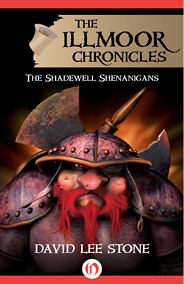Shadewell Shenanigans (23 page)
Read Shadewell Shenanigans Online
Authors: David Lee Stone

Saying nothing to his lazy subordinates on the eight o’clock shift, he backed slowly away from the window, walked casually out of his office, climbed carefully down the rickety ladder that separated his own sentry box from those on the lower level, sneaked out of view along the dark alleyways opposite the city wall and promptly shot off across town like a crossbow bolt.
Tikki could run
fast –
he’d been able to ever since he was a boy – and he could also hurdle, so nothing short of an unexpected high wall was going to slow his progress. There were certainly no unexpected high walls in
this
part of Dullitch, where the houses were so close together that their upper stories were affectionately known as “kissers.”
Tikki dashed up the ridiculously narrow, uneven cobbled lanes until he found a house with something that thieves would have referred to as the “golden drainpipe.” Spotting the property out of the corner of his eye, he hurried over to it, shinned up the pipe, scrambled on to the ramshackle roof and produced an old but very trusty spyglass from the depths of his jerkin.
The rooftop view appeared, and was quickly twisted into focus. It took Tikki a moment to find the shadow – mainly because the rain was lashing his face – but once he’d spotted it, he immediately knew from the divergence of direction and the incredible urgency of pace that it could only be heading for one location: the palace.
Tikki took a deep breath, and put on a burst of speed that he usually reserved for downing ale in the Ferret at closing time. In just under ten seconds, he’d crossed six roofs and made a very unlikely-looking jump between two buildings loosely linking the rich and poor districts. Recovering quickly, he dropped onto the dodgy slates of Finlayzzon’s and, unfurling a coil of rope and a miniature grapple, managed to get halfway along the jutting buttresses of Karuim’s Church before slipping in the unforgiving rain and sliding awkwardly to the street below.
No time for such a mistake
…
He groaned as he struggled up from the mud, then swung the rope around in a wild arc and began the frantic climb back to the top of the church. Progress was fast, but not nearly fast enough for Tikki’s liking. Finally, engraved with grit, grime and countless scratches, he hauled himself onto the highest of the church’s many spires, locked the grapple in place and lowered himself gently over the side.
Drawing level with the palace walls, he kicked himself away from the church’s north face and landed squarely on the battlements opposite. His rope was more difficult to retrieve this time, so much so that he almost left it, but eventually perseverance paid off.
So … around the palace wall …
… through a door in the (alarmingly empty) guard post …
… and down the spiral staircase.
Then outside, across the palace gardens …
… grappling iron ready …
… swing …
… and up to the palace roof.
Tikki LaVale, through determination, speed and an outstanding knowledge of the city’s myriad byways, arrived on the roof of Dullitch Palace, sparing just enough time to draw his sword as his target landed on the other side of the building’s wide roof.
The shadow – for it was wreathed in a black, billowing cloak – rolled as it landed, depositing a small box on the rooftop, then leaped up and drew two swords with such speed that, for a moment, Tikki thought he might have imagined the move. Anticipating an immediate strike, he knelt and readied his own blade.
Then came a shock; as the figure drew near to the Guard Marshal, it pulled back the hood covering its face.
Relief flooded over Tikki LaVale.
“Human,” he said, gritting his teeth against the pelting rain. “I’ll admit I’m surprised; I thought at the very least you’d be Elfin. What’s in the box? Doomchuck powder? An explosive of some kind? Oh no, I see it’s moving. A poison lizard, then? Very original.”
The stranger paid no attention to Tikki’s words. Instead, he darted forward, whirled the two blades in a complicated web and swiftly struck out with them.
Tikki blocked both shots with his own sword.
“Two things,” he said, squinting through the downpour. “One: though I’m impressed with that turn of speed you showed in getting here, I should advise you that I was further away, and I still got here first. And two: it wouldn’t be fair of me not to tell you that – with the possible exception of Viscount Curfew himself – I’m probably the best sword in the city, so don’t even think –”
Tikki was interrupted by two immediate strikes, followed by a somersault and a third. Still, despite the fact that he parried all three, the action worried him enough to take a step back and study the face of his attacker.
“Who are you?” he said, gazing from the small, beady eyes to the straggly, rain-soaked hair. “What do you want here?”
The two men circled each other, looking for an opening.
“I assume you’re here for the viscount,” Tikki went on, while measuring the time between lightning strikes to see if it would aid his cause. “Who sent you? Legrash? Phlegm? Spittle? Hmm … funny, somehow you don’t look like an assassin …”
The fifth blow was aimed directly at Tikki’s face, and he dodged it with comparative ease: perhaps the talk was helping.
“I say you don’t look like an assassin because assassins are usually smart enough to keep themselves covered up,” he continued, smiling through a particularly vicious rumble of thunder. “Then again, maybe you’re just confident …”
Nothing was spoken by the stranger, but a sixth strike followed, then a seventh.
Tikki dived down to block the last blow, and realized with sudden, terrible horror that he’d left himself open to …
Ssssk.
Tikki grabbed for his throat, but he’d incorrectly predicted the stranger’s move: the throat wound was merely a scratch to divert attention from …
“Argghh!”
He staggered back, the stranger’s second sword buried deep in his chest, and …
… down came the rain.
The swordsman dragged the body of Tikki LaVale across the palace roof and deposited it beside one of the more magnificent buttresses. Then he retrieved the box he’d been carrying and crept carefully toward the upper stairwell hatch.
When he pulled on the brass ring and lifted the sturdy hatch, relief flooded over him: there were no guards on duty at the top of the tower. Ha! That would make the task
so
much easier than he had anticipated.
The swordsman slipped inside the tower and began to descend the spiral staircase: his box was shaking now, as the creature inside fought to escape its squat prison.
Down. Down. And out: into the main body of the palace.
The swordsman kept out of sight, expertly nipping between shade and shadow to ease his path through the drafty corridors.
At length, he arrived at Korvan’s Kitchen: the very heart of Dullitch Palace. A plaque above the doorway reminded all of Korvan, the legendary and somewhat officious cook who served Lord Bowlcock, the first Duke of Dullitch.
The swordsman didn’t bother to study the plaque, however, choosing instead to sneak around the edge of the kitchen, narrowly avoiding two stout servants that supported a giant soup-cauldron between them.
When the kitchen was blissfully empty, the swordsman made his move. Accepting that the solitude wouldn’t last long, he swiftly tossed the box onto the nearest workbench, snapped off the catch and yanked open the lid. Then he snaked a hand into the silky depths of the inner case and pulled out a small, wriggling creature with a thick head of fur, three black eyes and a gleaming set of tiny, needle-sharp teeth.
The swordsman whistled at the creature, which abruptly ceased its struggling and began to mew like a contented kitten.
“Saving up that wonderful noise?” he whispered, and, reaching down with his other hand, he produced two wads of cotton wool from his robe.
As if sensing imminent danger, the creature began to struggle again, clawing at the fist that held it aloft by its hair.
A tabby cat watched from a nearby bench as the swordsman jabbed a cotton-ball firmly into each ear, and drew a thin and extremely nasty-looking blade from his belt.
“The stage is all yours,” he said to his restless captive. Then he stabbed it vigorously in the stomach.
A few minutes later, the swordsman replaced the dead creature inside its box, and prepared to leave the kitchen. He stepped over a number of prone servants and several patches of shattered glass on his way to the first floor.
V
ISCOUNT CURFEW LOOKED UP
from his writing desk, his quill poised over the leather-bound diary that lay open upon it.
Another flash: how he
hated
lightning. Still, his fear of the electric wrath was as nothing to his fear of the noise that always followed it. Thankfully, he had his earplugs firmly wedged in, and the mirrors had all been turned to face the wall: safety, first.
The viscount stared out of the window opposite his desk at the rooftops of eastern Dullitch. It was a humid night, something that would undoubtedly help to prolong the storm.
Still, he was far too busy to worry about such things: storm or no storm, he had work to do.
Curfew returned his attention to the diary, and was about to put quill to parchment, when there came a loud clatter from the direction of the stairs.
The viscount sighed, threw down his quill and stomped over to the bedroom door. However, because he was at all times a cautious man, he drew his sword before he opened it.
No assassin, then,
he thought, casting an annoyed glance at the men in grimy overalls who were attempting to fold a white sheet at the top of the stairs. He noticed that, as usual, his room guards were both fast asleep.
“You two!” he snapped at the sheet-folders. “What are you doing?”
The largest of the pair, a veritable
lion
of a man, turned to face him.
“Cleaners, guv: we’re putting these sheets away.”
Curfew rolled his eyes.
“Well, try not to make so much noise.”
“Right you are. Sorry, guv.”
“Hmm,” Curfew began, a frown developing on his brow. “They look weighed down in the middle: do you have someone wrapped up in there? You do, don’t you?”
In answer to this, the big man heaved at one end of the sheet, and a bruised and battered body fell out.
Curfew started, and strained to see the face of the prone figure.
“Isn’t that the fellow who delivers the vegetables?” he inquired.
“Dunno,” hissed the second sheet-folder, who was a good deal smaller than his companion. “Isss it?”
“Yes! What happened to him?”
“He ssstuck his nose in where it wasn’t wanted; gave usss some trouble while we were trying to scrub the floors.”
“He looks dead.”
“Nah,” growled the giant. “He’ll be all right with a jug of ale thrown over ’im.”
Viscount Curfew sighed.
“Fine; just keep the noise down, will you?” he snapped. Then he turned and shut the portal behind him. Unfortunately, in doing so he failed to notice that the ears of his snoring room sentries were bleeding.
Back in the bedchamber, Curfew muttered under his breath and carefully locked the oak door: then he turned around a second too late to avoid a gloved fist slamming into his face.
He fell back against the wall, shook his head and frantically brought up his sword, just as the assassin he’d been expecting to see in the corridor drew his own weapon.
All rights reserved, including without limitation the right to reproduce this ebook or any portion thereof in any form or by any means, whether electronic or mechanical, now known or hereinafter invented, without the express written permission of the publisher.
This is a work of fiction. Names, characters, places, events, and incidents either are the product of the author’s imagination or are used fictitiously. Any resemblance to actual persons, living or dead, businesses, companies, events, or locales is entirely coincidental.
Copyright © 2005 by David Lee Stone
Cover design by Mauricio Diaz
Cover illustration by Bob Lea
978-1-4804-6149-9
This edition published in 2014 by Open Road Integrated Media, Inc.
345 Hudson Street
New York, NY 10014






